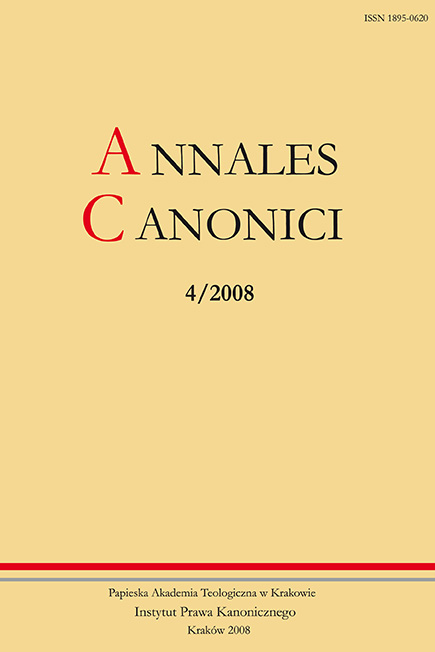The dissolving of a ratified marriage in the meaning of the "Norms" of Congregation for the Doctrine of the Faith from 2001
DOI:
https://doi.org/10.15633/ac.0412Abstract
The Congregation for the Doctrine of the Faith issued in the year 2001 the Norms about the possibility of dissolving marriages. It lays down in art. 1 that a marriage entered into by couple in that at least one person was unbaptized can be dissolved before ratifying it after receiving baptism by both spouses. The Congregation in the Introduction to the Norms was searching the problem in historical aspect and divided the question of dissolving marriages into four groups. The first possibility in the history of the Church was the Pauline privilege that allowed for dissolving a marriage entered into by two non-baptized people after that one of them has received baptism. The next ages showed situations that were not foreseen by Apostol. During the age of exploration, Catholic missionaries in Asia, South and Central America and the Caribbean encountered natives who were favorably disposed toward the Christian faith but who were impeded from receiving baptism because of polygamy and separation due to captivity or persecution. The sixteenth century popes like: Paul III, Pius V, Gregory XIII issued constitutions in that allowed of dissolving non sacramental marriages, different from cases met by Apostol Paul. There was the same rule in all these situations: at least one of spouses was unbaptized and wanted to receive baptism or a marriage before receiving baptism by both spouses was not ratified. From the oldest times the Catholic Church has saved the main rule that only sacramental and ratified marriage can not be dissolved. From that times we can say about four possibilities: Pauline privilege, favor of the faith, dissolving marriages because of polygamy or because of separation due to captivity or persecution. Formally the Code of Canon Law from 1917 extended these rules (previously included in the constitutions) to the universal Church. The Norms from the year 2001 of Congregation of the Doctrine of Faith confirmed original teaching of the Church and focused on dissolving marriage in favor of the faith. The author of the article focused on dissolving marriage in the Pauline privilege and in privilege of the faith. He was less interested in two next ways, because they are connected with and they are just a part of the second possibility of dissolving marriages. There are three conditions for application of the Pauline privilege: a marriage was entered into by two unbaptized people; one of them and only one received baptism; the still unbaptized spouse departured. There are three essential conditions for dissolution of a marriage in favor of the faith, too: at least one of the parties was unbaptized; marriage was not ratified after receiving baptism; if dissolution is requested to permit the marriage of a catholic with an unbaptized person or a baptized non-catholic the guaranties about practicing and education children in the catholic faith must be granted. The similar rules must be saved in the cases of dissolving marriages for the sake of polygamy and separation due to captivity or persecution.
Downloads
Published
Issue
Section
License
Copyright (c) 2008 Tomasz Rakoczy

This work is licensed under a Creative Commons Attribution 4.0 International License.
The author declares that he owns the copyright to the work (article) and that it is not limited in the scope covered by the above declaration and that the work (article) is an original work and does not infringe the copyright of other persons.
The author allows the Pontifical University of John Paul II in Krakow to use the paper free of charge, non-exclusive and unlimited in time by, i.e.:
– keeping in records and reproduction of the copies of the work using printing, reprography, magnetic recording and digital technology;
– trade in the original or copies on which the work has been recorded (introduction to the market, lending or rental of the original or copies, public exhibition, display, as well as making the work available to the public in such a way that everyone can have access to it in a place and at a time chosen by them);
– inclusion of the work in a collective work;
– granting by the Pontifical University of John Paul II in Krakow a Creative Commons Sub-licence Authorship Recognition-Non-commercial Use-No Subsidiaries 3.0 Poland
The Pontifical University of John Paul II in Krakow makes the work available on the Magazine Platform of the university under the Creative Commons Attribution-Non-commercial Use-No Subsidiary Works 3.0 Poland license.
Thus, it entitles all interested parties to use the work under the following conditions:
- the author and the title of the work will be given,
- the place of publication (journal title and internet address of the originally published work) will be indicated,
- the work will be distributed in a non-commercial manner,
- no dependent works will be created.

